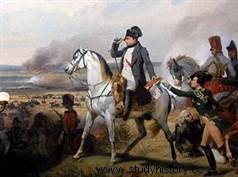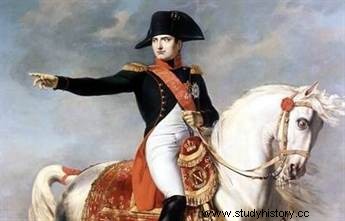 The Battle of Wagram , in Austria, is the last great victory of Napoleon I, won over the Austrian armies on July 6, 1809 northeast of Vienna. This battle marked the end of the Austrian campaign and allowed Napoleon to reduce the fifth European coalition against France since 1792. The Grande Armée, which had retook Vienna on May 12, had been severely tested at Essling, a few dozen kilometers, on May 21 and 22:it must have retreated, approaching Vienna at Lobau Island.
The Battle of Wagram , in Austria, is the last great victory of Napoleon I, won over the Austrian armies on July 6, 1809 northeast of Vienna. This battle marked the end of the Austrian campaign and allowed Napoleon to reduce the fifth European coalition against France since 1792. The Grande Armée, which had retook Vienna on May 12, had been severely tested at Essling, a few dozen kilometers, on May 21 and 22:it must have retreated, approaching Vienna at Lobau Island.
The Battle of Wagram
Withdrawn from the conflict since the Treaty of Presburg in 1805, Austria resumed hostilities against Napoleon I in April 1809 and reorganized its army. The French Emperor retook Vienna on May 13, 1809, but was defeated at the Battle of Essling on the 22nd as he attempted to cross the Danube. Hostilities resumed on May 4:the French had 188,000 men and 488 artillery pieces; marshals Oudinot, Davout, Masséna and Bernadotte, among others, made up the staff.
Facing them, commanded by Archduke Charles, the Austrians lined up 132,000 men and 446 artillery pieces. On the battlefield, what was at stake was the control of the Danube and its crossing. On several occasions, the French troops were nearly overwhelmed, and Napoleon's military intelligence, which made massive use of his artillery, found the opportunity to manifest itself to its full extent, for example, when he retook a position where Bernadotte and his Saxons had been crushed by the Austrians.
Napoleon's last great victory
 However, at the end of this battle, the relative weakening of the French armies was obvious:too cosmopolitan to Being homogeneous, suffering from the delays of certain generals and the uncertainties of troops of barely trained conscripts, the Grande Armée owed this incomplete victory solely to the genius of Napoleon. The Austrian army remained sufficiently threatening for the Treaty of Vienna, which ended the war on October 14, 1809, to be relatively moderate:75 million francs in indemnities and the cession of Illyria to France and a part of Galicia to Russia. Napoleon's remarriage to Marie-Louise de Habsbourg was another consequence of this ambiguous victory.
However, at the end of this battle, the relative weakening of the French armies was obvious:too cosmopolitan to Being homogeneous, suffering from the delays of certain generals and the uncertainties of troops of barely trained conscripts, the Grande Armée owed this incomplete victory solely to the genius of Napoleon. The Austrian army remained sufficiently threatening for the Treaty of Vienna, which ended the war on October 14, 1809, to be relatively moderate:75 million francs in indemnities and the cession of Illyria to France and a part of Galicia to Russia. Napoleon's remarriage to Marie-Louise de Habsbourg was another consequence of this ambiguous victory.
Bibliography
- Wagram, July 5-6, 1809:a hard-won victory for Frederic Naulet. Napoleon I Editions, 2008.
- Wagram (July 5 and 6, 1809):The cannon thunders on the banks of the Danube by Frédéric Naulet. Economica 2009.
- Dictionary of Napoleon's Battles:1796-1815 by Alain Pigeard. Tallandier, 2004.
